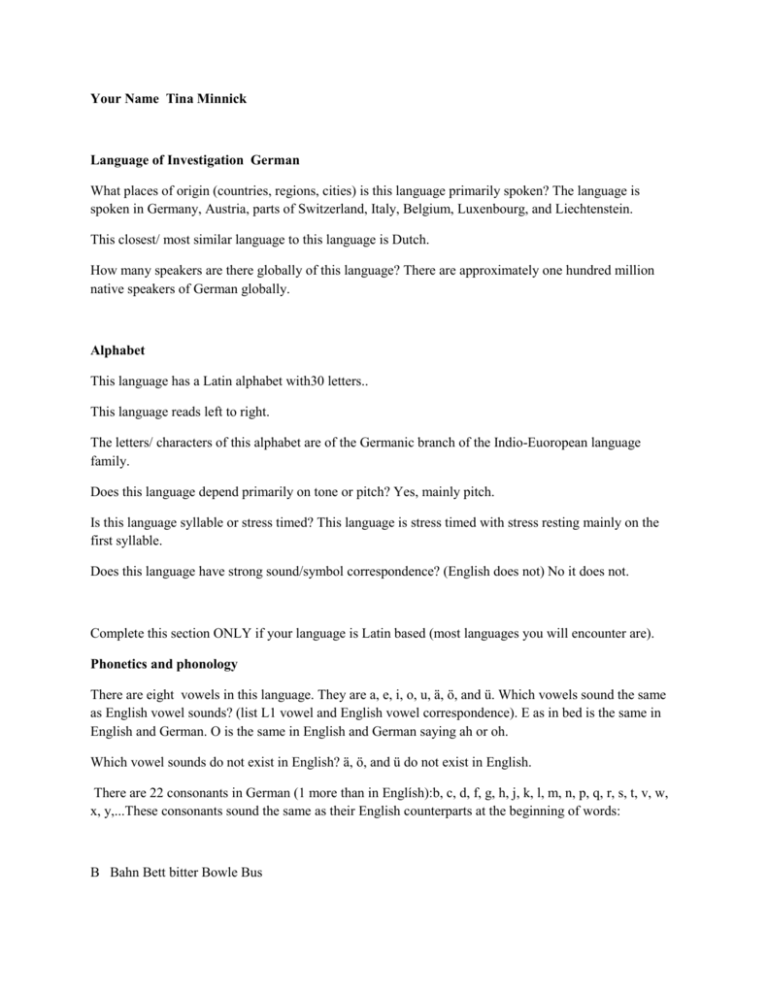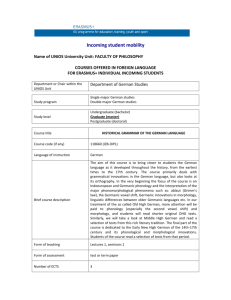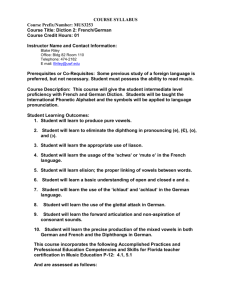German Linguistic Analysis
advertisement

Your Name Tina Minnick Language of Investigation German What places of origin (countries, regions, cities) is this language primarily spoken? The language is spoken in Germany, Austria, parts of Switzerland, Italy, Belgium, Luxenbourg, and Liechtenstein. This closest/ most similar language to this language is Dutch. How many speakers are there globally of this language? There are approximately one hundred million native speakers of German globally. Alphabet This language has a Latin alphabet with30 letters.. This language reads left to right. The letters/ characters of this alphabet are of the Germanic branch of the Indio-Euoropean language family. Does this language depend primarily on tone or pitch? Yes, mainly pitch. Is this language syllable or stress timed? This language is stress timed with stress resting mainly on the first syllable. Does this language have strong sound/symbol correspondence? (English does not) No it does not. Complete this section ONLY if your language is Latin based (most languages you will encounter are). Phonetics and phonology There are eight vowels in this language. They are a, e, i, o, u, ä, ö, and ü. Which vowels sound the same as English vowel sounds? (list L1 vowel and English vowel correspondence). E as in bed is the same in English and German. O is the same in English and German saying ah or oh. Which vowel sounds do not exist in English? ä, ö, and ü do not exist in English. There are 22 consonants in German (1 more than in Englísh):b, c, d, f, g, h, j, k, l, m, n, p, q, r, s, t, v, w, x, y,...These consonants sound the same as their English counterparts at the beginning of words: B Bahn Bett bitter Bowle Bus D Dame denken dick doof dumm F Fahne Fell finster Form Fuchs H haben Hexe hinter Holz Hut K kalt Keller Kind Kohle kurz L lang leben links los Lust M Mama Messer mit Mohn Mühe N nach neben nicht Note null P Papa perfekt Pickel Popo putzen T Talent Text Tier tot tun . Which consonant sounds do NOT exist in English? none. What sounds do speakers of this language have difficulty pronouncing? They pronounce the English v as an English w. They say the English th sound as x because th doesn’t exist in German and the sound of z in German is close to the th sound. Ells often write I or a when the teacher says e or r. Are there any sound placements that are different between English and this language? What are they? The sounds of both languages are similar.The German w sounds like v. The th sound does not exist in German. Do any double letter combinations exist in this language? What are they and what do they correspond to in English? (For example, Spanish: /ll/ = English /y/). The double s sound is used in German. In English it corresponds to Syntax and Grammar How many tenses exist in this language? German does not have a continuous tense form. What are they? Germans tend to only speak in the present tense. The word order of this language is subject, verb, past participle, any remaining verbs. What are the punctuation forms used in this language? List using English comparisons. German punctuation rules are stricter. Nouns are capitalized. How does this language mark gender? Some German nouns have more than one gender/meaning. Most words referring to humans are masculine even when referring to females. Animal words have no gender. Morphology What are some shared cognates between English and this language? German and English share many cognates: Winter/winter, Haus/house, trinken/drink, etc. What are some FALSE cognates between English and this language? . Many cognates, however, do not have the same meaning (i.e. they are false friends). For example, the German word also means so in English, not also; aktuell means current not actual. Through your research what have you found are the biggest difficulties of speakers of this language learning English? Please provide specific examples. I feel the biggest problem would be learning to use the “th”sound and the v sound. It would also be hard to realize that some of our vowels sound different than theirs like a, I and u. Our I is said as in sit while their I says it as in eek. Their u says oo while ours says uh. I think it would be hard for them to see that our language uses the feminine and masculine forms in writing. It would be difficult to learn to speak and write using past, present, and future tenses instead of just present tense. If you have an early production ELL who this language is their L1, what would be the most important thing you will teach them in regards to the difference between their language and English? I would teach them the “th” sound. I would practice the v sound with them and then using different tenses in their writing. I would teach them that their language is very close to ours and that they will have little difficulty learning English and that we value their language too. I will motivate the student and provide comprehensible input. I will paraphrase and repeat what the student says while proviving visuals and recordings.I will model the language and provide ample time for the student to think about what he is going to say.







